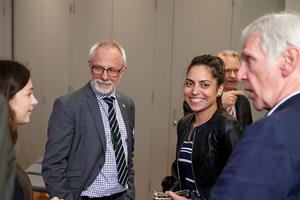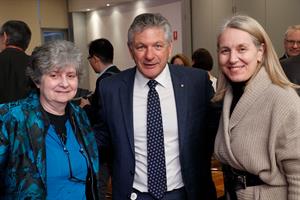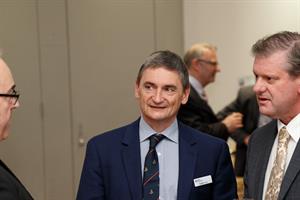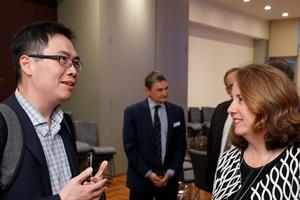The Alfred Event
 My fellow RACP Board Directors and I held a Conversation with the Board event at The Alfred in Melbourne on Thursday 4 October following our College Council meeting earlier that day.
My fellow RACP Board Directors and I held a Conversation with the Board event at The Alfred in Melbourne on Thursday 4 October following our College Council meeting earlier that day.
This gave us opportunity for a collegial and open discussion with members about a range of issues covering education and training, workplace issues and the culture of the College. I hope more members will take the opportunity to attend these events in future.
We would like to share this discussion with you and make sure that some important messages are fed back from, and to, the membership.
Associate Professor Mark Lane
RACP President
We heard that the timing of the Divisional Clinical Exams each year, during winter, continues to impact already stretched hospitals and needs to be reviewed.
We acknowledge how logistically difficult it is for participating hospitals to run the clinical exams during flu season. In addition to curriculum changes, we are exploring how we can run each Divisional Clinical Exam twice each year, and different ways to manage assessment. However, realistically it will be two to five years before we see significant change.
We heard that the College needs to place patients at the centre of its planning around training activities, and consider the cost of training in consideration of patient outcomes and the financial impact of running the exams on the hospital system.
 We acknowledge the contribution the public health system makes to physician and paediatrician training. We are working to build stronger relationships with our state health department stakeholders and partners. The College has established a Consumer Advisory Group, which is already guiding how we improve consumer engagement and patient centred care across our professional standards, education and policy and advocacy activities.
We acknowledge the contribution the public health system makes to physician and paediatrician training. We are working to build stronger relationships with our state health department stakeholders and partners. The College has established a Consumer Advisory Group, which is already guiding how we improve consumer engagement and patient centred care across our professional standards, education and policy and advocacy activities.
We heard the focus on getting trainees through the exam is affecting their ability to develop clinical skills, and their clinical usefulness.
The new Basic Training curriculum has a much greater emphasis on Entrustable Professional Activities (EPAs), which focus on daily clinical work and judgement calls, and should lead to clinical skill development earlier on in the Basic Training program. When EPAs work effectively, they reduce the reliance on assessment through examination, and break down the assumption that learning is only achieved didactically. We need to achieve greater recognition that some of the best experience for trainees is what they’re doing in the workplace.
The new curriculum will also change the style of supervision that is required, with Directors of Physician Education and Supervisors being far more involved in trainees’ clinical skill development through more feedback on clinical practice, with the training process enabling trainees to steadily move from total supervision to independent clinical practice.
We heard about resource constraints and the effect this is having on wellbeing, as well as concerns about how quality training can be delivered under increasingly constrained budgets and productivity pressures.
The College’s new training site accreditation standards have specific requirements regarding wellbeing and seek to protect the quality of training. Supported by a stakeholder management plan to enable stronger partnerships with health departments, training site accreditation is currently the most significant lever available to the College to address the quality of training.
 We discussed how we can improve members’ access to help at the College and heard about the need for a more human College that members can feel part of.
We discussed how we can improve members’ access to help at the College and heard about the need for a more human College that members can feel part of.
The College undertook a comprehensive Member Journey Mapping project in 2017 to better understand current member experiences and how we can work to improve these. The findings from this project are now informing every piece of work the College does.
We’re introducing a new member enquiry phone line with a single number that will enable members to choose the subject matter of their enquiry and be directed to the right subject matter expert straight away. We’ve introduced LiveChat, an interactive website chat system so we can help members while they’re navigating the RACP website. We’ve also introduced a College-wide compliments and complaints framework, which is reported on regularly to the Board and will help us improve how we deliver our services to members by enabling feedback on what does and doesn’t work. We are also looking at how we can create opportunities for members to interact with each other more easily through the College.
We heard about the frustration some dual-qualified members feel who are unable to have their RACP CPD recognised by The Royal College of Pathologists of Australasia (RCPA).
This is a known issue and the main crux to this is that the RACP does not run Quality Assurance programs that are equivalent to those run by the RCPA. It is appreciated that this is frustrating for members. Discussions with the RCPA continue.
We heard from trainees who shared their views about the timing of examinations and exam results, the desire for clinical skills to be developed earlier in their training and the need for the focus and reliance on the exams to be addressed. We heard that the move to establish a Paediatric Lecture Series to match that for Adult Medicine is welcomed. We heard that trainees want to be recognised by the College as whole people, so they can be good partners, parents and friends, as well as trainees.
 The College is exploring all of these issues associated with the timing of the exams. The College is aware of the reports of challenging behaviours that trainees experience in training position interviews and has communicated with health departments about this. It has developed a Health and Wellbeing Strategic Roadmap and provided a comprehensive set of resources and support networks on the College website. These recognise the need for trainees to be regarded as whole people who are going through an intense and increasingly competitive period of training, and more work is being undertaken to raise awareness of the need for trainees’ health and wellbeing to be respected and supported in their workplaces.
The College is exploring all of these issues associated with the timing of the exams. The College is aware of the reports of challenging behaviours that trainees experience in training position interviews and has communicated with health departments about this. It has developed a Health and Wellbeing Strategic Roadmap and provided a comprehensive set of resources and support networks on the College website. These recognise the need for trainees to be regarded as whole people who are going through an intense and increasingly competitive period of training, and more work is being undertaken to raise awareness of the need for trainees’ health and wellbeing to be respected and supported in their workplaces.
We heard that trainees are disappointed that the Ferrier Hodgson investigation into the 2018 Divisional Written Exam has taken so long, and the College has not provided more regular updates on its progress. We heard the College needs to rebuild trust amongst trainees, and how it communicates the findings of the Ferrier Hodgson final report will be central to rebuilding this trust.
We heard trainees accept Pearson Vue was at fault, however seek information on whether the College’s checks and balances fell short and what will be done to prevent this happening again. They feel the College failed in its efforts to communicate effectively with trainees about the arrangements surrounding the exam before it was run, and also when it failed.
Pearson Vue has taken responsibility for the Written Exam failure publicly and has already paid the College $2.3 million to cover associated costs of the exam failure. The College took quick action to address the exam failure and has acted to improve processes while it awaits the Ferrier Hodgson Report.
The Board welcomes any process improvements identified by the Ferrier Hodgson Report and will communicate its findings to members.
The Board is committed to transparency and is working with College staff to establish better ways for members to raise concerns and have direct dialogue – such as these Conversation with the Board events. It is committed to cultural change and rebuilding trust with its members.